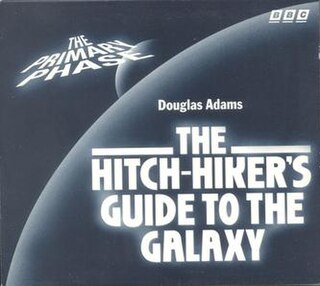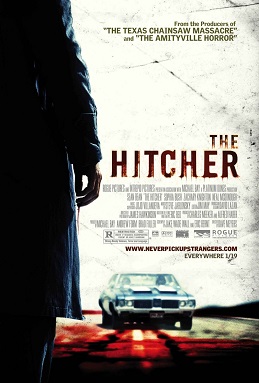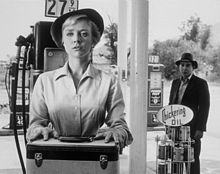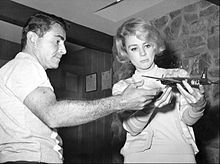
The Hitchhiker's Guide to the Galaxy is a comedy science fiction franchise created by Douglas Adams. Originally a 1978 radio comedy broadcast on BBC Radio 4, it was later adapted to other formats, including novels, stage shows, comic books, a 1981 TV series, a 1984 text adventure game, and 2005 feature film.

Mostly Harmless is a 1992 novel by Douglas Adams and the fifth book in the Hitchhiker's Guide to the Galaxy series. It is described on the cover of the first edition as "The fifth book in the increasingly inaccurately named Hitchhikers Trilogy". It was the last Hitchhiker's book written by Adams and his final book released in his lifetime.

The Hitch-Hiker is a 1953 American independent film noir thriller co-written and directed by Ida Lupino, and starring Edmond O'Brien, William Talman and Frank Lovejoy. Based on the 1950 killing spree of Billy Cook, the film follows two friends who are taken hostage by a murderous hitchhiker during an automobile trip to Mexico.

Suspense is a radio drama series broadcast on CBS Radio from 1940 through 1962.
"Walking Distance" is episode five of the American television series The Twilight Zone. It originally aired on October 30, 1959. The episode was listed as the ninth best episode in the history of The Twilight Zone by Time magazine.

Christine is a horror novel by American writer Stephen King, published in 1983. It tells the story of a car apparently possessed by malevolent supernatural forces. In April 2013, PS Publishing released Christine in a limited 30th Anniversary Edition.
The vanishing hitchhiker is an urban legend in which people travelling by vehicle, meet with or are accompanied by a hitchhiker who subsequently vanishes without explanation, often from a moving vehicle.

Towel Day is celebrated every year on 25 May as a tribute to the author Douglas Adams by his fans. On this day, fans openly carry a towel with them, as described in Adams' The Hitchhiker's Guide to the Galaxy, to demonstrate their appreciation for the books and the author. The commemoration was first held 25 May 2001, two weeks after Adams' death on 11 May.

Return to Glennascaul,, is a 1951 Irish short film starring Orson Welles. It was written and directed by Hilton Edwards, produced by Micheál Mac Liammóir for Dublin Gate Theatre Productions and distributed by Arthur Mayer.

The terms Primary Phase and Secondary Phase describe the first two radio series of The Hitchhiker's Guide to the Galaxy, first broadcast in 1978. These were the first incarnations of the Hitchhiker's Guide to the Galaxy franchise. Both were written by Douglas Adams and consist of six episodes each.

Violet Lucille Fletcher was an American screenwriter of film, radio and television. Her credits include The Hitch-Hiker, an original radio play written for Orson Welles and adapted for a notable episode of The Twilight Zone television series. Lucille Fletcher also wrote Sorry, Wrong Number, one of the most celebrated plays in the history of American radio, which she adapted and expanded for the 1948 film noir classic of the same name. Married to composer Bernard Herrmann in 1939, she wrote the libretto for his opera Wuthering Heights, which he began in 1943 and completed in 1951, after their divorce.
"Valley of the Shadow" is a 51-minute episode of the American television anthology series The Twilight Zone. In this episode, a reporter is held captive in a small town after he discovers its incredible secret.
"You Drive" is episode 134 of the American television anthology series The Twilight Zone. It originally aired on January 3, 1964, on CBS. In this episode, the perpetrator of a fatal hit-and-run is hounded by the car he committed the crime with. Earl Hamner Jr. reprised this story, as he had already used it in the 1954 TV series 'Justice'.

The Hitcher II: I've Been Waiting is a 2003 American direct-to-DVD road horror thriller directed by Louis Morneau and starring C. Thomas Howell, returning as Jim Halsey, Kari Wuhrer as his girlfriend Maggie, and Jake Busey as psychotic hitchhiker Jack. It is the sequel to the 1986 film The Hitcher. The film was released on direct-to-DVD in the United States on July 15, 2003.

The Hitcher is a 2007 American road horror thriller film starring Sean Bean, Sophia Bush and Zachary Knighton. It is a remake of the 1986 film of the same name starring Rutger Hauer, C. Thomas Howell and Jennifer Jason Leigh. The Hitcher was directed by Dave Meyers and produced by Michael Bay’s production company Platinum Dunes.
"The Hitch-Hiker" is a short story by Roald Dahl that was originally published in July 1977 issue of the Atlantic Monthly, and later included in Dahl's short story collection The Wonderful Story of Henry Sugar and Six More. The story is about a man who picks up a hitch-hiker whilst driving to London. The pick-pocketing of a policeman's notebook during a traffic stop closely follows "Hitch-Hike", a 1960 episode of Alfred Hitchcock Presents based on a short story by Ed Lacy.
"A Day in Beaumont" is the first segment of the twenty-fourth episode of the first season of the television series The Twilight Zone. In this segment, a couple spends an entire day trying to convince the people of a small town that aliens have landed nearby.

Two Weeks Vacation is a 1952 American animated short film produced by Walt Disney Productions and released by RKO Radio Pictures. The cartoon follows Goofy on an ill-fated vacation trip traveling cross country. It was directed by Jack Kinney and features the voices of Pinto Colvig as Goofy and Alan Reed as the narrator and a hitchhiker.

The Hitch-Hiker is a radio play written by Lucille Fletcher. It was first presented on the November 17, 1941, broadcast of The Orson Welles Show on CBS Radio, featuring a score written and conducted by Bernard Herrmann, Fletcher's first husband. Welles performed The Hitch-Hiker four times on radio, and the play was adapted for a notable 1960 episode of the television series The Twilight Zone.
A hitchhiker is someone who goes hitchhiking.















